Indoor air quality (IAQ) is an essential aspect of our daily living, significantly impacting our health and comfort. As we spend a considerable amount of time indoors, the role of Heating, Ventilation, and Air Conditioning (HVAC) systems cannot be overlooked. In this article, we’ll discuss the functions of HVAC systems in maintaining good indoor air quality and helpful tips for optimizing their effectiveness.
Why is Indoor Air Quality Important?
Poor IAQ can contribute to an array of health problems, ranging from mild discomforts like headache, dizziness, and fatigue to more severe allergies and respiratory conditions. Prolonged exposure to poor air quality can also lead to serious ailments such as lung cancer and heart disease. Therefore, maintaining good IAQ is integral to our health and wellbeing.
Apart from health risks, substandard IAQ can impact comfort levels in various ways. High humidity can make an environment feel stuffy, while low humidity can cause skin dryness and irritation. Uneven temperature or inadequate ventilation can also lead to discomfort.
How HVAC Systems Improve Indoor Air Quality
A good HVAC system can improve your indoor air quality in the following ways:
- Filtering airborne particles
HVAC systems’ air filters help reduce allergens and dust particles in the air. Timely replacement of filters prevents the accumulation of dirt, dust, and allergens, ensuring cleaner indoor air. - Controlling humidity levels
Too much or too little humidity can lead to various problems, such as mold growth, allergies, and discomfort. HVAC systems manage humidity levels by removing excess moisture from the air, creating a comfortable environment. - Proper ventilation
A well-designed HVAC system ensures adequate air circulation and ventilation, allowing fresh outdoor air to replace stale indoor air. This practice dilutes indoor contaminants and reduces potential health risks. - Eliminating pollutants
Some HVAC systems include sophisticated air purification options that can help remove harmful pollutants like volatile organic compounds (VOCs). Devices such as air purifiers or UV lamps enhance air quality by eliminating pathogens and odors.
Optimizing Your HVAC Systems for Better Indoor Air Quality
Follow these suggestions to maximize your HVAC system’s efficiency and improve indoor air quality:
- Regular maintenance
Ensure your HVAC system is assessed and maintained by professional technicians regularly. Routine maintenance helps identify and fix any issues, guaranteeing optimal performance. - Air filter replacement
Replace your HVAC air filters every 30-90 days, depending on your system and manufacturer’s recommendations. This practice helps maintain cleaner air and reduces the risk of dirt and allergens. - Proper sealing of ducts
Leaky ducts can introduce unfiltered outdoor air and contaminants into your living spaces. Ensure your HVAC ducts are adequately sealed to prevent air leaks and to increase energy efficiency. - Investing in additional air purifying devices
Consider adding air purifiers or UV lamps to your HVAC system to further improve indoor air quality. These devices can remove harmful pollutants and pathogens from the air, creating a healthier environment. - Regularly cleaning your home
Keeping your home clean by vacuuming and dusting helps reduce the presence of allergens and pollutants. These practices, combined with a well-functioning HVAC system, contribute to improved IAQ.
The role of HVAC systems in maintaining good indoor air quality is undeniable. Following the tips mentioned above will ensure your system works efficiently and effectively to create a healthy living environment.
